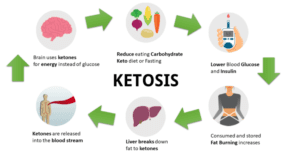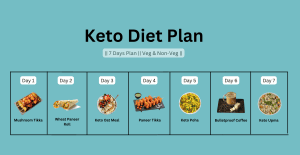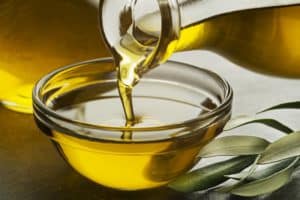Honey is the best healthy alternative to regular sugar. In this article, we will get to know what is honey, how it is made, the carbs in honey, its nutritional benefits, can we have honey on a low-carb keto diet or not.
What is Honey?
Honey is a sweet, viscous food substance made by honey bees and some related insects. Bees as we know produce honey from the sugary secretions of plants (floral nectar) or from secretions of other insects (such as honeydew), by regurgitation, enzymatic activity, and water evaporation. Bees store honey in wax structures called honeycombs. The variety of honey produced by honey bees (the genus Apis) is the best-known, due to its worldwide commercial production and human consumption. Honey is collected from wild bee colonies, or from hives of domesticated bees, a practice known as beekeeping or apiculture.
How honey is Made?
Honey is made from those busy little bees you probably shriek away from anytime one gets near. These small insects may seem like a summertime annoyance, but they’re one of the most valuable creatures on the planet. Bees pollinate plants, helping to fertilize over 30% of the world’s crops and 90% of wild plants.
Honey originates from flower nectar, which honey bees collect as a source of water and carbohydrates. A typical worker bee will store up to 40mg of nectar, and transport this nectar back to the hive, where it will be ingested, processed, and regurgitated to form honey.
Specific enzymes in the bee’s stomach help speed the process of transforming nectar into honey by breaking down the sucrose molecules into easily digestible fructose and glucose.
Honey Nutritional Facts
The USDA provides the following information for 1 tablespoon (21 grams) of 100% pure bee honey
- Calories: 64
- Fat: 0g
- Sodium: 0mg
- Carbohydrates: 17g
- Fiber: 0g
- Sugars: 17g
- Protein: 0g
- Carbs In Honey- The calories in honey come from carbohydrates, specifically sugar. The sugar in honey is about 50% glucose and 50% fructose. The glycemic index of honey depends on the type that you buy, but sources estimate it to be around 58 with a glycemic load of 12. For comparison, the glycemic index of table sugar (sucrose) is 65.
- Vitamins and Minerals – The vitamins and minerals in honey may include B vitamins, calcium, copper, iron, zinc, and others, which are mainly derived from the soil and nectar‐producing plants. The quality of honey and its mineral content, you can determine it by where it is grown and how it is processed. Generally, darker honey provides more beneficial vitamins and minerals than pale honey.
- Protein –Honey contains trace amounts of protein depending upon the product (up to 0.06g in some honey products), but not enough to contribute to your daily protein requirements.
- Fats – There is no fat in honey.
Is Honey Keto?
No, Honey is not at all keto-friendly.
A tablespoon of raw honey has 17g of carbs (16 of which come from sugar). The fat content of the sweetener is neither ideal for keto dieters as honey contains zero grams. High is a high carb food and holds no place in the keto diet.
Will honey prevent ketosis?
So honey isn’t keto-friendly, but do you have to completely avoid it while you are on the diet? Fortunately, the answer is no.
Ketosis is a metabolic state and to reach it, you need to keep your carb intake at the minimum while increasing the fat you consume. This way, your body will produce and rely on ketones for energy instead of glucose.
To remain in ketosis, the average person can eat between 25 and 50g of carbs per day. The permitted carb intake can be higher for active individuals who can consume a daily “dose” of up to 100g to stay in ketosis.
One tablespoon of honey probably won’t prevent your body to go into ketosis. But if you eat honey in huge quantities, you shouldn’t be surprised that ketosis won’t commence and your keto diet’s progress will reverse.
So if you are careful when eating honey and keep your daily carb intake within the ranges I mentioned, then honey won’t kick you out of ketosis.
Eating honey in large quantities will prevent you from entering ketosis and reverse your progress. For keto diet beginners, it may be best to hold off.
Low-Carb Sweeteners to Use instead of Honey-
Instead of honey, choose a sweetener with zero calories that won’t spike your blood sugar. Like honey, these sweeteners are healthy alternatives to table sugar and rank low on the glycemic index. They won’t spike your blood sugar or insulin levels — two adverse side effects of honey.
Choose one of these keto-friendly sweeteners instead of honey:
- Stevia
- Monk fruit
- Erythritol
Takeaway
Honey is one of nature’s best inventions. In relative terms, honey is healthier than white sugar, thanks to a variety of antioxidants, enzymes, and micronutrients. Honey also is more easily digestible than table sugar, thanks to the enzymes that help a bee transform flower nectar into honey.
For those on keto, honey should not be your go-to food. Its high levels of carbohydrates can easily knock someone out of ketosis if they eat too much too quickly. Since carbs in honey are high and not keto-friendly, you’re better off choosing stevia or monk fruit as a keto-friendly sweetener.
Get started with your Weight Loss Journey today and take a step towards a healthy lifestyle! Stay tuned for inspiring Weight Loss Journeys, and Delicious Recipes! Also, don’t forget to follow us on Instagram for the daily dose of Health, and Wellness content!








